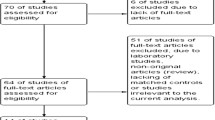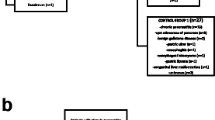Abstract
Pancreatic cancer is a disease with a dismal outcome and a 5-year survival rate of under 5%. Recent studies have shown that pancreatic cancer consists of an accumulation of genetic and epigenetic alterations during tumor development as in other human cancers. Therefore, new diagnostic methods for early detection and more effective therapeutic strategies based on a better understanding of the molecular biology of pancreatic cancer are urgently required. Recently, promoter hypermethylation of cancer-related genes has emerged as an important mechanism in carcinogenesis. The present review summarizes an overview of the alterations of promoter hypermethylation in pancreatic cancer, and suggests that the further study of promoter hypermethylation involvement in pancreatic cancer and the delineation of molecular mechanisms involved may lead to an improvement in the outcome of this aggressive disease.
Similar content being viewed by others
Author information
Authors and Affiliations
Rights and permissions
About this article
Cite this article
Kuroki, T., Tajima, Y. & Kanematsu, T. Role of Hypermethylation on Carcinogenesis in the Pancreas. Surg Today 34, 981–986 (2004). https://doi.org/10.1007/s00595-004-2858-6
Received:
Accepted:
Issue Date:
DOI: https://doi.org/10.1007/s00595-004-2858-6




